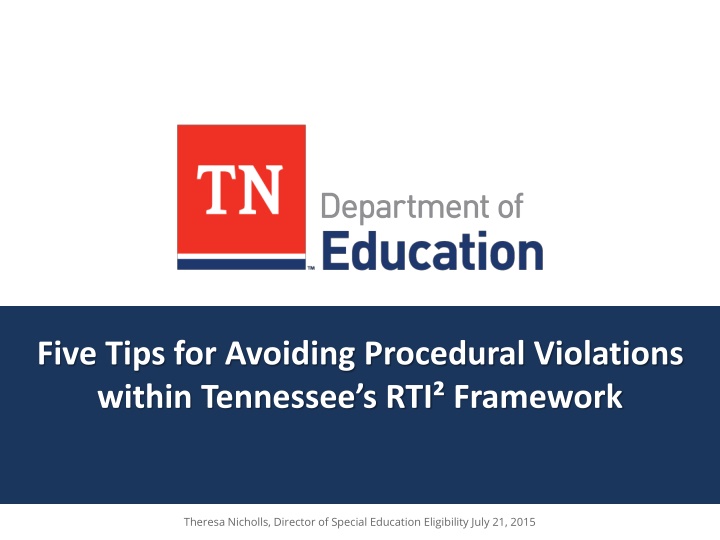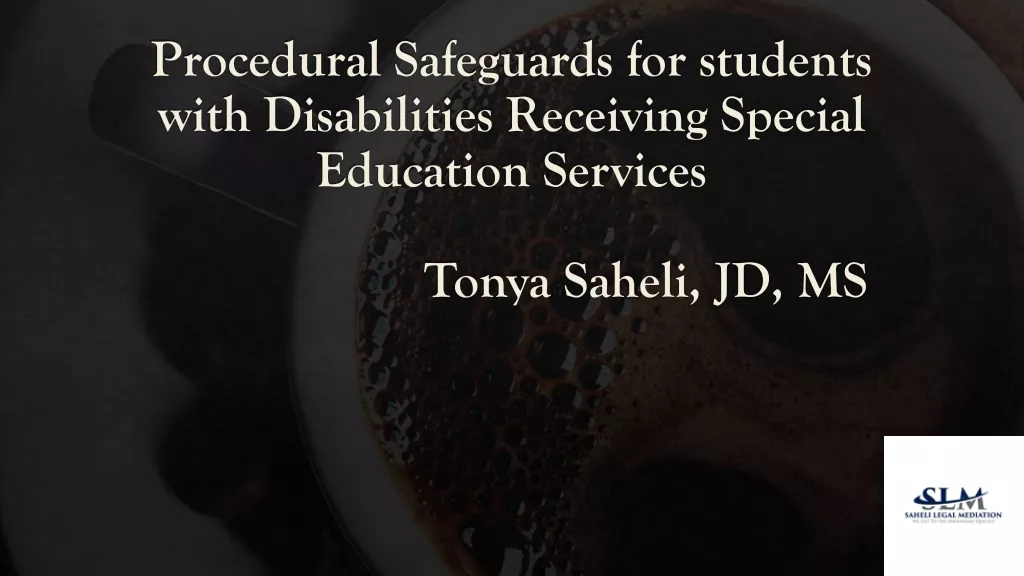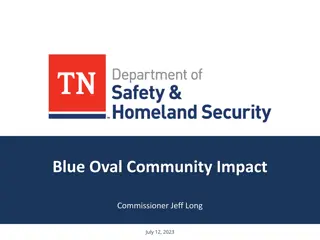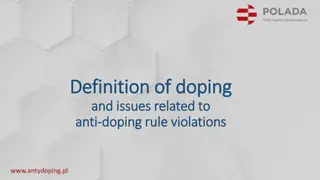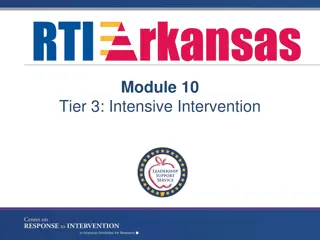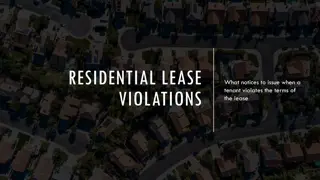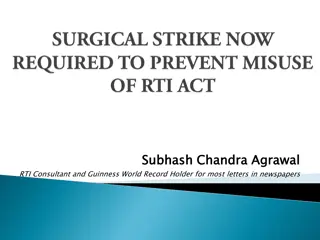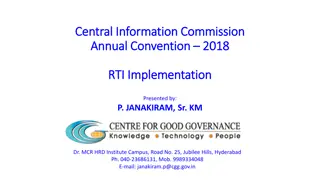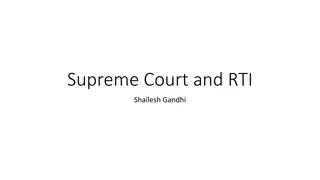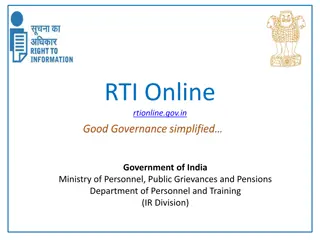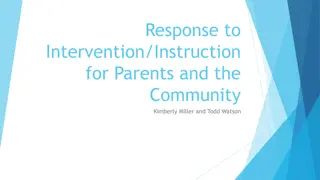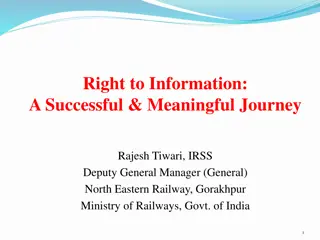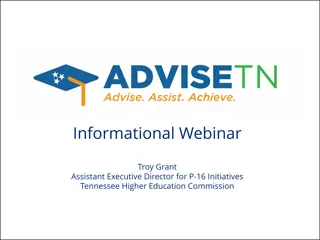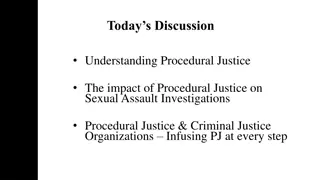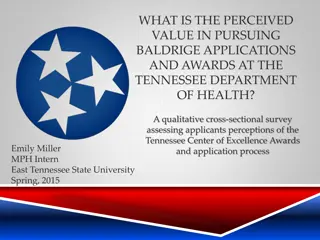Avoiding Procedural Violations in Tennessee's RTI Framework
Gain valuable insights on avoiding procedural violations within Tennessee's Response to Intervention (RTI) framework through the guidance provided by Theresa Nicholls, Director of Special Education Eligibility. Learn about the risks associated with procedural violations, review pertinent case law, receive consultative strategies for supporting school personnel in data-based decision-making, and understand appropriate responses to evaluation requests. Get updated on the policy changes and the implementation of RTI in identifying students with specific learning disabilities. Explore the significance of the Individuals with Disabilities Education Act (IDEA) and the requirements for Local Education Agencies (LEAs) to ensure services for students with disabilities.
Download Presentation

Please find below an Image/Link to download the presentation.
The content on the website is provided AS IS for your information and personal use only. It may not be sold, licensed, or shared on other websites without obtaining consent from the author.If you encounter any issues during the download, it is possible that the publisher has removed the file from their server.
You are allowed to download the files provided on this website for personal or commercial use, subject to the condition that they are used lawfully. All files are the property of their respective owners.
The content on the website is provided AS IS for your information and personal use only. It may not be sold, licensed, or shared on other websites without obtaining consent from the author.
E N D
Presentation Transcript
Five Tips for Avoiding Procedural Violations within Tennessee s RTI Framework Theresa Nicholls, Director of Special Education Eligibility July 21, 2015
Objectives Develop an understanding of the risk for procedural violations within RTI Review existing case law related to procedural violations and RTI implementation Gain consultative strategies to support school personnel in effective data based decision making Learn how to respond appropriately to requests for evaluations
Disclosure These materials are not intended as legal advice, and should not be so construed. Law, local policy, and unique facts make dramatic differences in analyzing any situation. Consult your LEA attorney for legal advice regarding a specific situation. I AM NOT A LAWYER
Policy change As of July 1, 2014, RTI is the framework used to identify students with a specific learning disability Phase in option: Middle school- July 1, 2015 High school- July 1, 2016 RTI Framework Manual RTI Implementation Guide
Individuals with Disabilities Education Act (IDEA) Federal Special Education Law Ensures services to students with disabilities across the country IDEA governs how states and public agencies provide early intervention, special education and related services to youth with disabilities
Individuals with Disabilities Education Act (IDEA) Requires that Local Education Agencies (LEAs): Identify students at risk for disabilities Child Find Parent referrals Evaluate students suspected of a disability Timely evaluations Determine students eligibility for special education services State and federal definitions Develop an Individual Education Program (IEP) for eligible students based on student need All decisions are made by the IEP team Provide a Free and Appropriate Public Education (FAPE) for students with disabilities
Procedural Safeguards Student with disabilities and their parents have certain rights under IDEA These safeguards are designed to protect the rights of parents and their child with a disability and, at the same time, give families and school systems several mechanisms by which to resolve their disputes.
What familiar song is this? We are desirous of extending to you by way of seasonal salutation, in respect of which we undertake to convey by means including but not limited to speech, writing, hand signals, electronic devices and other and any information conveyances in existence now and in the future, a sanguine and unrepining saturnalian season and a euphoric neologian period of not less than but not more than twelve (12) months, including such adjustment as from time to time may be necessitated by leap years where appropriate.
Procedural Safeguards State administrative complaint Mediation Due Process Hearing
OSEP Memo 07-11 The use of RTI strategies cannot be used to deny or delay a parent s request for evaluation to a student suspected of a disability If the LEA agrees that the student is suspected of a disability, they must evaluate If the LEA does not agree that the student is suspected of a disability, they must provide prior written to the parent of the refusal to evaluate
Potential for Procedural Violations within an RTI Framework Child Find Timely evaluations Parent requests for evaluation Eligibility determinations Pre-determination
Due Process Hearings and RTI Overall, we have not seen an increase in litigation involving RTI as anticipated: Recency of widespread implementation Time lag in adjudication process Delay in parents/attorneys learning nuances of RTI Deference towards schools in methodology- related issues Zirkel (2015)
C.M. v Lafayette School District District used RTI as a pre-referral process to help struggling students in the general education program Assessment wall meetings Complete RTI results and graphs were not shared with parents C.M. received intervention during K and 1st grade Referred for special education during 1st grade and found eligible as a student with a specific learning disability C.M. received special education services for 2 years C.M. failed to make progress in his special education program
C.M. v Lafayette School District Parents requested private evaluations Found severe dyslexia and stated the current IEP services were insufficient to meet his needs Parents withdrew C.M. and filed due process Appropriateness of initial evaluation Parental involvement in eligibility determination Provision of FAPE Finding upon appeal: The district was obligated to share RTI data with parents. Parents were entitled to reimbursement for private evaluation and instruction
Salem-Keizer School District (Oregon) First grade student Nine discipline incidents in 2 weeks Performing below grade level Parents requested an evaluation Signs of anxiety and behavior problems School explained the RTI process Two months after initial request, the school agreed to evaluate Parents filed complaint with Oregon DOE FINDING: District s response was inappropriate . The school s explanation of RTI was a way of summarily dismissing the parent s request . Corrective action required.
Franklin County School District (Florida) State complaint involving seven students Students receiving interventions through RTI Students referred for special education evaluation Evaluations conducted Eligibility meetings held more than 60 days after consent District claimed the students hadn t had sufficient RTI to determine the presence of a disability Qualified professionals were not present to interpret results of evaluation FINDING: The district violated procedures and corrective action was required
Five Tips for Avoiding Procedural Violations
#1 Focus on the Data Don t get caught up in the process
#2 Respond to the Data If it s not working, CHANGE IT! Don t collect data for the sake of collecting data Use your data to make instructional decisions Weighing the cow doesn t make it fatter!!
#3 Respond appropriately to requests for evaluation True or False? Students must remain in intervention for a certain amount of time before they can be referred for testing
Common Pitfalls We don t have enough data points He/she has to go through RTI first
#4 Avoid pre-determination All decisions regarding eligibility and placement must be made by the IEP team Common Pitfall: He/she has not been in RTI long enough. If we test him/her now, he won t be eligible .
#5 Refer anytime a disability is suspected Poor performance in more than one subject area Reports of medical diagnosis Inadequate response to tiered interventions through RTI2 Difficulty producing age-appropriate speech sounds Language skills are inconsistent with those expected of same age peers Poor fine/gross skills Rate of progress has decreased
References Special Ed Connection http://www.specialedconnection.com/LrpSecStoryTool/splash.jsp Questions and Answers on IDEA Part B Dispute Resolution Procedures http://s3.amazonaws.com/tacc-uploads/ Zirkel, P.A. (2015). The Legal Meaning of Specific Learning Disability for IDEA Eligibility: The Latest Case Law http://www.nasponline.org/publications/cq/41/5/legal- meaning.aspx
Contact Information Theresa Nicholls, Ed.S., NCSP Director of Special Education Eligibility Theresa.Nicholls@tn.gov 615-741-0572
